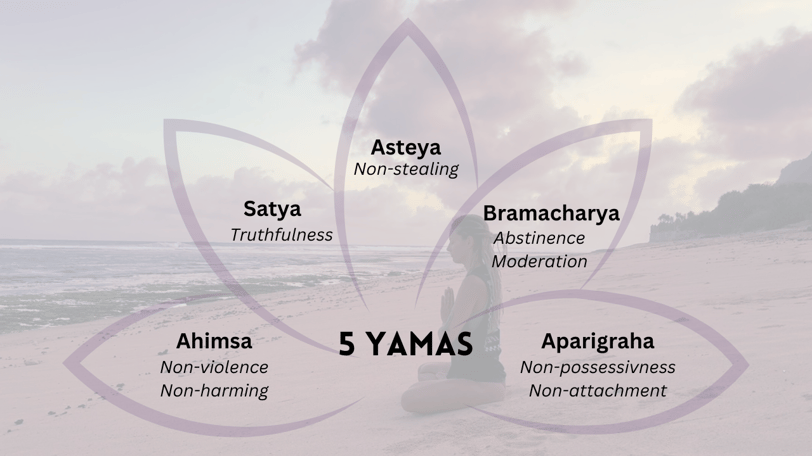The 5 Yamas: The don'ts of life - or: “Do not do to others what you would not want done to yourself.”
Yoga philosophy
1/7/20254 min read


1. Ahimsa (non-violence/non-harming): “Be kind! To others, to yourself, and yes, even to your ass-angels.”
Where does violence actually begin? Do you think you are a peaceful person? Violence can have different forms of expression and doesn't just refer to physical violence. The energy of aggression and violence also resonates in actions such as slamming a door or destroying something on purpose. You have probably already experienced for yourself how hurtful even thoughtless words or non-verbal gestures can be. But let's go one step further. Have you ever thought about the fact that you can hurt and harm someone, and especially yourself, through your thoughts? Practice compassion, gentleness and acceptance a little more every day and you will notice that your surroundings will often adapt too. Become a source of peace and gentleness, we need it so much in our current social situation and don't we all actually long for it?
2.Satya (truthfulness/not lying): Lying is like junk food or excessive shopping - it feels good for a short time, but causes problems in the long run.
"The truth will set you free," says not only the Bible. Truthfulness also plays an important role in yoga and your spiritual development, because lying takes us away from our inner truth. The first step to authenticity is to be honest with yourself. However, we should be aware that our truth is always filtered through our subjective perception - there are as many truths as there are people. True honesty means not only speaking your own truth, but also questioning whether what you are saying serves a greater whole or merely satisfies your ego. Is it a lie not to say something? In a yogic context, this is not an easy question to answer. Again, you should reflect on the intention behind your silence: Is it for harmony and truth, or is it for self-protection or convenience? By feeling inside and listening to your gut, you can recognize what feels right for you. Ultimately, spiritual growth is a path of self-reflection in which we learn to align our actions with service and authenticity. Honesty is an expression of love for ourselves, for others, and for the world.
3.Asteya (desirelessness/non-stealing): From wanting to have to letting be!
Asteya, the principle of non-stealing, lovingly reminds us that abundance arises when we take and give mindfully. It's not just about material things - we can also learn not to take time, energy or attention that doesn't belong to us. Perhaps Asteya means waiting patiently instead of taking the lead in a conversation. Or it invites us to share ideas without the need to own them. Even the urge to be constantly present online can be a kind of 'stealing' - from our own calm and connection to the here and now. When we carry Asteya in our hearts, we realize that everything essential is already available to us. The world gives us so much when we treat it gently and respectfully. Perhaps we don't need endless to-do lists or material things to be content. Perhaps it is enough to consciously take a deep breath and feel life with gratitude. Asteya shows us that when we stop grasping, our hands open to the gifts that life wants to give us anyway.
4. Brahmacharya (abstinence/moderation): Quality instead of quantity! Yes, even with sex!
Originally, brahmacharya in yoga actually referred to sexual abstinence. Yogis were convinced that sexual energy could be transformed in order to promote our spiritual growth. As a yogi, one strives for unity with the highest. Sex was seen as a distraction and a drain on energy. But does this mean that as yogis we have to give up sexuality? In this day and age, such an approach would hardly be practicable and, in my opinion, rather a denial of an expression of love, devotion and joy. Sexuality is something wonderful, divine - it offers the opportunity for energy to flow throughout the body and for two souls to meet, connect and merge on all levels. Isn't that exactly what spiritual transformation is all about? So how can we integrate this yama into our modern lives? It is not just about renunciation, but rather about finding a harmonious balance in our passions. The true essence lies in the moderate use of our energy - be it in our thoughts, in our actions or in the people and things to which we give our attention. How much energy do we consciously allow to flow into that which nourishes and strengthens us, and how much do we lose to that which ultimately does not serve us? Even the most beautiful things in life can harm us if we indulge in them too much or use them as a distraction. Conscious enjoyment means being in the moment and not allowing yourself to be led by short kick or impulsive desires. Find the balance that supports you on your path and gives you true fulfillment
5. Aparigraha (humility/non-attachment): The whole world is at my disposal, but I do not own it!
It is an invitation not to cling to possessions, opinions or even to our own “I”. Because what we cling to begins to possess us. So when you're thinking about whether you need that new tech gadget or the latest outfit, remember: things come and go, but your true self remains untouched. Attachment means believing that you are worth less without that 'something', but Aparigraha shows us that true fulfillment is not dependent on external factors. When we don't cling to our possessions or our ideas, we create space for life to unfold, with all its ups and downs. It is the deeper state where you feel light as a leaf in the wind, ready to dance with the changes of life without holding on or struggling. Because clinging is like a heavy backpack that prevents us from experiencing life in its full lightness. Those who don't hold on to anything have everything they need: inner peace, freedom and the ability to flow in every situation. When you let go of thoughts in your yoga practice, give up striving for perfection and simply stay in the moment, you are practising aparigraha. It means connecting with the flow of life without expecting everything to remain as it was or is. By letting go, you will realize in depth: “You are not what you own. You are what you can let go of.”
The Yamas are five ethical principles that provide guidance on how to constructively live certain values and resulting behaviors in social interactions.
Soul Solutions
Holistic yoga coaching for your physical, mental and spiritual well-being.
E-Mail: kontakt@soulsolutionsyoga.com
Created with Love © 2024.All rights reserved Impressum / private policy
